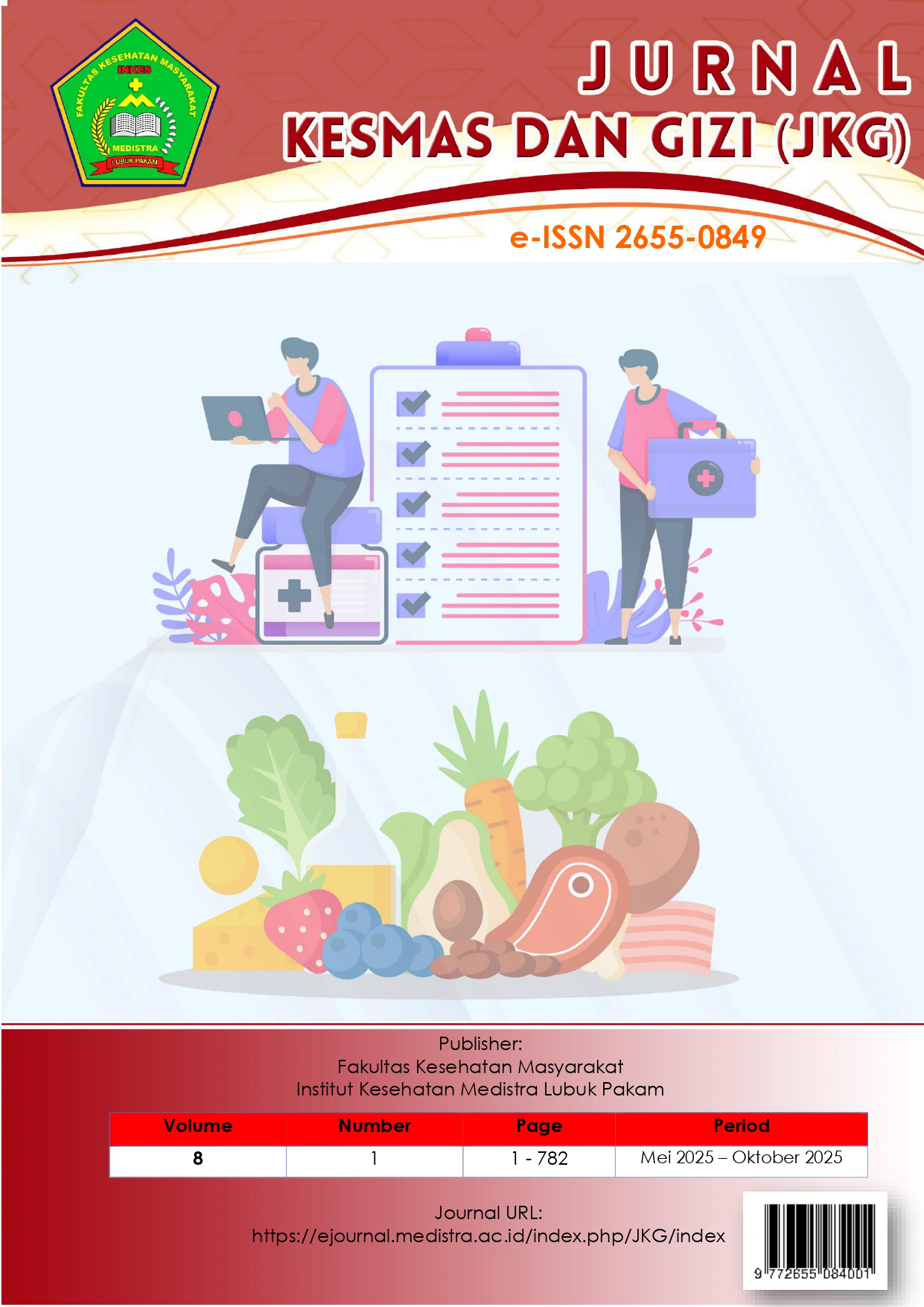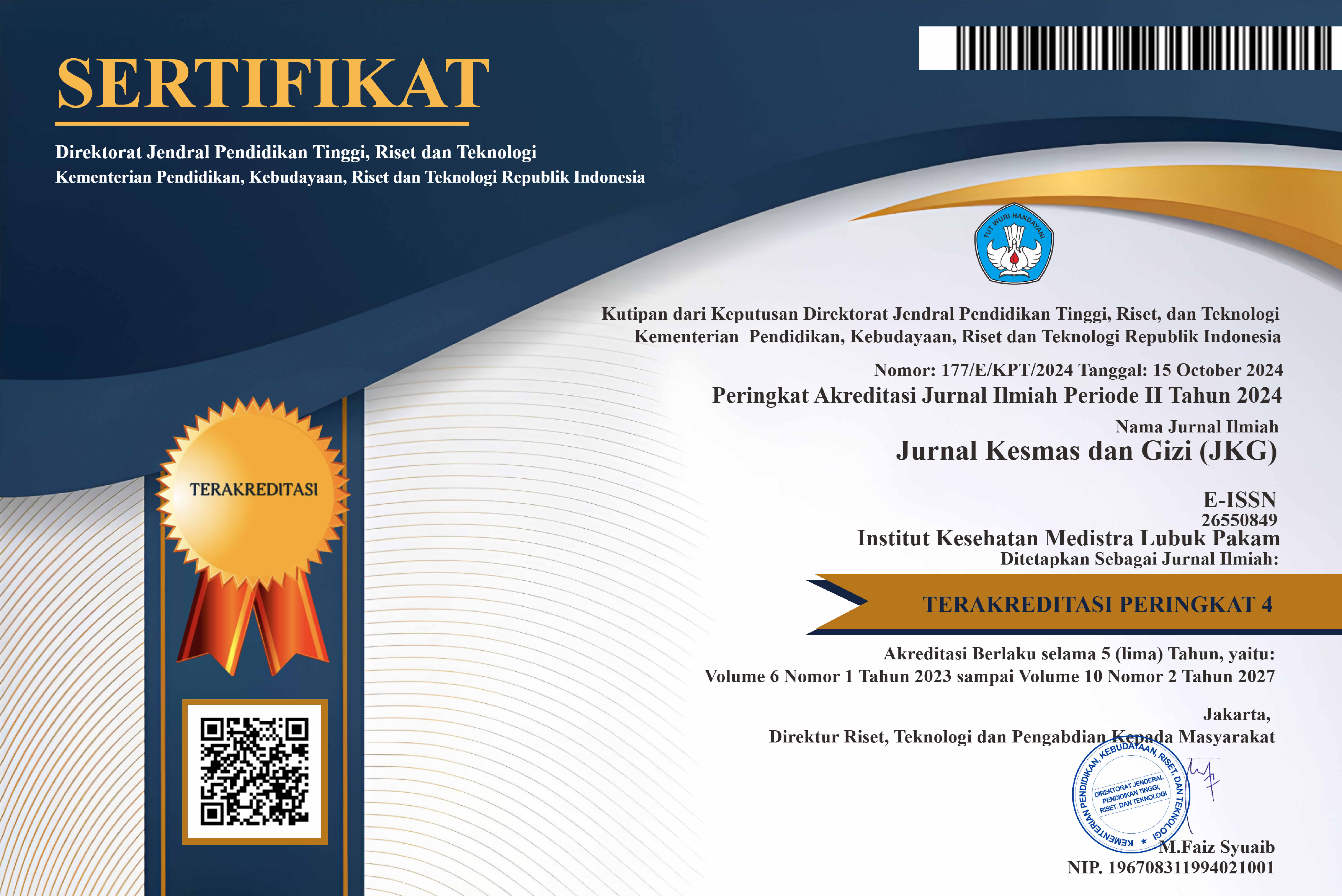The Factors Associated with the Implementation of Integrated Management of Sick Children (IMCI) by Health Workers
DOI:
https://doi.org/10.35451/cc03w272Keywords:
Integrated Management of Childhood Illness (IMCI), healthcare workers, training, resources, implementationAbstract
Background: Integrated Management of Childhood Illness (IMCI) is a key strategy in improving the quality of healthcare for sick children, with an approach that includes diagnosis, treatment, and disease prevention. The success of IMCI implementation is highly influenced by various factors related to healthcare workers, such as the availability of resources, training, and organizational support. Research Objectives: This study aims to identify the factors influencing the implementation of IMCI by healthcare workers in primary healthcare facilities, particularly at community health centers (puskesmas). Research Methods: This study employs a quantitative approach with a cross-sectional design. Data were collected through interviews and observations of healthcare workers at several puskesmas implementing IMCI. The analysis was conducted to determine the relationship between factors affecting the implementation of IMCI. Results: The study found that the most influential factors in the implementation of IMCI are the availability of resources, including medicines and medical equipment. Additionally, adequate training for healthcare workers and sufficient organizational support are crucial to ensure effective IMCI implementation. Other factors influencing the implementation include communication among healthcare workers and the involvement of families in the care process of sick children. Conclusion: The factors influencing IMCI implementation should be taken seriously, including enhancing the quality of training, fulfilling resource needs, and strengthening organizational support and communication among healthcare
Downloads
References
[1] Walimah, R. (2021). Evaluasi Kualitas Pelayanan Kesehatan di Puskesmas. Medan: Universitas Kesehatan.
[2]. Anggraini, A., et al. (2022). Manajemen Terpadu Balita Sakit di Indonesia. Jakarta: Penerbit Kesehatan.
[3]. Indrayani, S., & Okrianti, I. (2022). Penerapan Pendekatan IMCI dalam Pelayanan Kesehatan Anak. Jakarta: Penerbit Ilmiah.
[4]. Mastuti, N., et al. (2021). Prosedur Pelaksanaan MTBS untuk Balita Sakit. Surabaya: Kesehatan Masyarakat Press.
[5]. Ayuvie, R. (2021). Faktor Predisposing dan Enabling dalam Pelaksanaan MTBS di Puskesmas. Medan: Jurnal Kesehatan.
[6]. Faisal, S., et al. (2021). Penerapan MTBS untuk Meningkatkan Kualitas Kesehatan Anak. Surabaya: Pustaka Medika.
[7]. Immawanti, S. (2023). Peran Petugas Kesehatan dan Perangkat Desa dalam MTBS. Yogyakarta: Lembaga Penelitian Kesehatan.
[8]. Hartono, H., et al. (2020). Pengaruh Sarana dan Prasarana terhadap Kualitas Pelayanan Kesehatan di Puskesmas. Jurnal Kesehatan Masyarakat, 15(2), 120-125.
[9]. Indrayani, S., & Okrianti, I. (2022). Penerapan Kebijakan dalam Pelayanan Kesehatan Anak di Puskesmas. Jurnal Administrasi Kesehatan, 22(1), 33-41.
[10]. Rahmawati, A. (2021). Peran Perangkat Desa dalam Mendukung Program Kesehatan di Komunitas. Jurnal Kesehatan Desa, 19(2), 108-115.
[11]. Sulaiman, R., et al. (2020). Penerapan Kebijakan dalam Meningkatkan Pelayanan Kesehatan di Fasilitas Kesehatan Primer. Jurnal Administrasi Kesehatan, 22(1), 45-52.
[12]. Susanti, P. (2018). Keterlibatan Petugas Kesehatan dalam Keberhasilan Program Kesehatan Masyarakat. Jurnal Administrasi Kesehatan, 24(1), 32-39.
[13]. Hartono, H., et al. (2020). Pengaruh Sarana dan Prasarana terhadap Kualitas Pelayanan Kesehatan di Puskesmas. Jurnal Kesehatan Masyarakat, 15(2), 120-125.
[14]. Wulandari, R., & Hartatti, A. (2020). Faktor-faktor yang Mempengaruhi Implementasi MTBS di Puskesmas. Jurnal Kesehatan Masyarakat, 16(3), 134-140.
[15] Rahmawati, A. (2021). Peran Perangkat Desa dalam Mendukung Program Kesehatan di Komunitas. Jurnal Kesehatan Desa, 19(2), 108-115.
[16] Wahyuni, D. (2020). Sikap Positif Masyarakat terhadap Program Kesehatan di Tingkat Desa. Jurnal Kesehatan Masyarakat, 16(1), 45-51.
[17]. Notoatmodjo, S. (2012). Pengantar Ilmu Kesehatan Masyarakat. Jakarta: Rineka Cipta.
[18]. Rahmawati, A. (2021). Peran Perangkat Desa dalam Mendukung Program Kesehatan di Komunitas. Jurnal Kesehatan Desa, 19(2), 108-115.
[19]. Susanti, P. (2018). Keterlibatan Petugas Kesehatan dalam Keberhasilan Program Kesehatan Masyarakat. Jurnal Administrasi Kesehatan, 24(1), 32-39.
[20]. Wahyuni, D. (2020). Sikap Positif Masyarakat terhadap Program Kesehatan di Tingkat Desa. Jurnal Kesehatan Masyarakat, 16(1), 45-51.
Downloads
Published
Issue
Section
License
Copyright (c) 2025 Kristin Monalisa Lubis, Felix Kasim, Rahmad Ramadhan Ritonga

This work is licensed under a Creative Commons Attribution 4.0 International License.
Copyright in each article is the property of the Author.



























